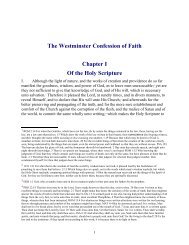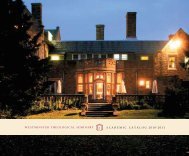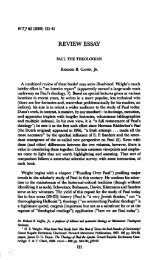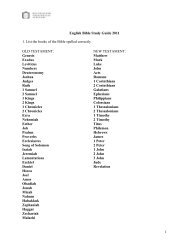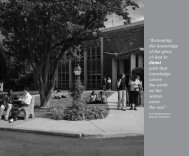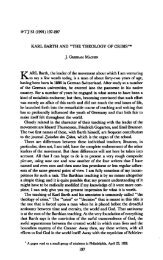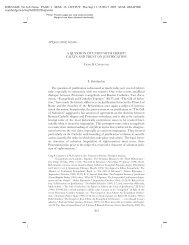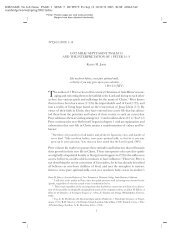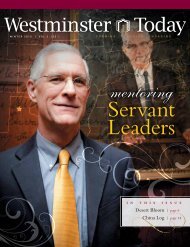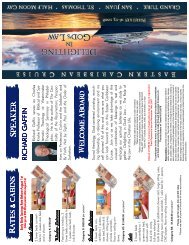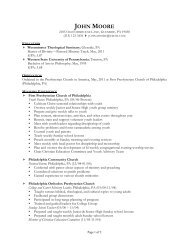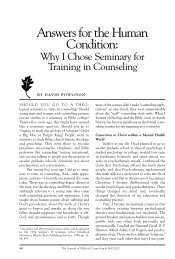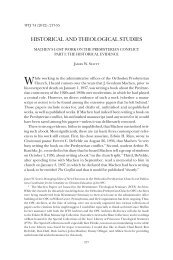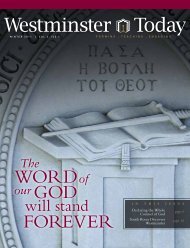2009 - 2010 Academic Catalog - Westminster Theological Seminary
2009 - 2010 Academic Catalog - Westminster Theological Seminary
2009 - 2010 Academic Catalog - Westminster Theological Seminary
You also want an ePaper? Increase the reach of your titles
YUMPU automatically turns print PDFs into web optimized ePapers that Google loves.
{Degree Programs}<br />
Doctor of Philosophy<br />
will normally be considered for transfer credit to the Th.M. or Ph.D.<br />
degree program.<br />
All course work must be completed within three years of the<br />
student’s initial registration in the Ph.D. program. The residency<br />
requirement of two years is an absolute minimum length of time<br />
that the student should expect to study on campus in course work.<br />
Only students who already have reading knowledge of French and<br />
German, who are able to waive the preliminary exams, and who<br />
are able to devote full time to their studies actually will be able to<br />
complete all the necessary requirements within a two-year period.<br />
If students need to complete preliminary studies or work to finance<br />
their education, they should plan to spend a longer period of time<br />
in residence.<br />
Students who have taken advanced work beyond a first theological<br />
degree may be given credit by the Field Committee for up to four<br />
courses of the residence requirement, depending on the nature<br />
and quality of the work; however, individuals who have actually<br />
obtained the Th.M. degree from <strong>Westminster</strong> may be given credit<br />
for up to five courses of the residence requirements. Credit for work<br />
pursued before the completion of requirements for the first theological<br />
degree shall be limited to two courses. No courses credited<br />
toward the first theological or other degree (with the exception of<br />
work toward the Th.M. as noted above in this paragraph) may be a<br />
part of the program for the Ph.D. degree.<br />
Study completed more than five years prior to registration for<br />
the Ph.D. program cannot be credited to the student’s work in this<br />
program.<br />
The student is required to maintain a general academic average<br />
of 3.0 during the program of residence study. If an average<br />
of 3.00 is not maintained, the student will be withdrawn from the<br />
<strong>Seminary</strong>.<br />
creatively to discussion of the fundamental problems in the field<br />
must be demonstrated. In each of the other two foci, the student is<br />
expected to show a general familiarity with basic issues and trends<br />
and to be aware of the contributions of specific individuals. In all<br />
three of the foci, the student must reflect on the <strong>Seminary</strong>’s own<br />
heritage and perspective, although no student is ever required to<br />
agree with the <strong>Seminary</strong>’s position on any issue. Detailed descriptions<br />
of the requirements for all of the examinations, including<br />
recommended reading lists for the examinations, are available to<br />
matriculated students from the Historical and <strong>Theological</strong> Faculty<br />
Support Office.<br />
The written comprehensive examinations in Historical and<br />
<strong>Theological</strong> Studies will be administered only three times a year:<br />
the last full week of October, the second full week of February, and<br />
the first full week of April. Students will be eligible to take their<br />
comprehensive examinations only after completing all coursework,<br />
languages, and preliminary exams. A written request should be sent<br />
to the Coordinator of the Field Committee one month in advance of<br />
the student’s intention to take the comprehensive examinations.<br />
(This means that the requests to schedule an examination may<br />
come only in the last week of September, the second week of<br />
January, and the first week of March.) Once the examinations are<br />
scheduled, the student may not change the date or time. The written<br />
examinations are on two days, eight hours for the major focus<br />
on the first day and six hours for the two minor focus examinations<br />
(three hours each) on the second day. There may not be more than<br />
one day between the two written examinations. The oral portion<br />
of the comprehensive examination will be scheduled as soon as<br />
possible after the written comprehensive examinations have been<br />
accepted.<br />
<strong>2009</strong>–<strong>2010</strong><br />
Comprehensive Examinations<br />
The written comprehensive examinations test the student’s knowledge<br />
of each of the three foci within the program. In the student’s<br />
major focus, extensive and in-depth knowledge is expected. The<br />
student will be required both to analyze and to evaluate the central<br />
documents and ideas within that field, and an ability to contribute<br />
94



